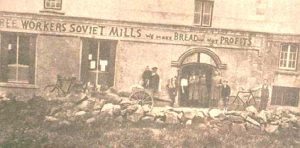
Capitalism’s whole goal is to make maximum profits for the capitalists, not to make products for people to use. The opposite: Workers in Limerick, Ireland drove out the British army in 1919 and took over their town for two weeks. The sign on the bakery they ran said “We Make Bread, Not Profits!” Communist Production is for the masses to use—for what we need!
Capitalism’s Competition for Profit Leads Inevitably to Depressions. Workers’ Only Solution: Communist Revolution
“The next global depression is coming and optimism won’t slow it down,” says Time Magazine.
Before the pandemic, capitalism was already heading in that direction. Covid-19 accelerated and intensified this development.
The masses are rising, unable to live like before. They are intensifying the class struggle. Our choices have never been clearer: capitalism’s depression, fascism, and war— or communist revolution.
This global crisis spells untold hardships and misery for billions of workers.
Worldwide unemployment is the highest since the Great Depression of 1929. It is expected to rise by as much as possibly 25 million people. (International Labor Organization). Underemployment is projected to rise even more, with a projected loss of as much as 12% of working hours.
The World Bank predicts that up to 100 million more people worldwide will fall into extreme poverty (less than $2 a day) depending on how long the pandemic lasts. This on top of the 700 million people already living in extreme poverty.
In the US alone millions could lose their homes by the end of the year.
This global crisis is caused by capitalism’s internal contradictions. Capitalists are driven by competition for maximum profits and market share. The losers die. But what they need to do to compete causes the rate of profit to fall for the survivors. It creates deeper misery for the masses.
What is the “rate of profit”?
The capitalists’ only source of profit is the workers’ labor power. When workers toil for a given time, they produce a certain amount of value. That value is much more than what they receive in wages to survive on.
The capitalists appropriate this value that workers produce. They use it to pay their production costs (machinery, materials, rent, energy, etc.) including the workers’ wages. What’s left is called surplus value, which the capitalists call profit.
The rate of profit is the ratio of this surplus value to the total capital investment (wages and machinery etc.) expressed as a percentage.
Competing for greater market share and profits, the capitalists buy expensive machines to out-produce and out-sell the competition. Machinery takes the place of workers. The capitalist invests more in machines with fewer workers producing surplus value or profits. Over time, this means a lower rate of profit.
Since competition is built into capitalism, the capitalists could never escape or permanently stop the rate of profit from falling. By introducing new machinery, paying workers less and intensifying their exploitation, individual capitalists may temporarily stop their rate of profit from falling. They may grab the highest profits in the industry, and bigger market share—until the competition catches up.
Then the falling rate of profit reasserts itself. Now the process repeats: even more automation and even fiercer competition. Manufacturers cheapen production costs to flood the market with goods they cannot sell profitably. Now they have a crisis of overproduction.
When the rate of profit falls too low in too many sectors, investors (finance capital) can’t find anywhere to invest profitably. Then stock markets crash, companies and banks fail globally. Workers are laid off by the millions. The market shrinks even more. The competition for markets intensifies. Eventually this leads to global war to destroy their rivals’ means of production, including their workers.
Only communism can end such a monstrous absurdity. Communism will abolish production for profits. Nothing will be bought or sold. No money, wage slavery, or competition. No wealth or poverty. No exploitation.
Collectivity and love for our working-class family will drive production based on need. We’ll be able to automate aspects of production to reduce our hours of labor. Abundance will not create disaster but the opportunity to share more!
This is the first article in a series. Some of the concepts presented here may be difficult to understand. We invite collectives to read and discuss these articles together. Then send in your comments and questions.
Future articles will discuss Depression, Fascism and War; Why Communism – Not Anarchism or Socialism; and more.


